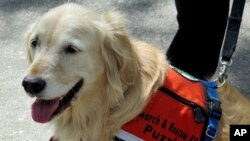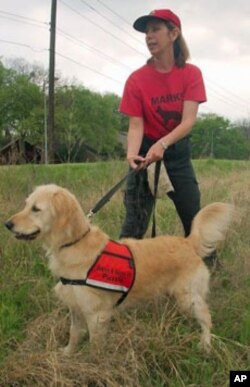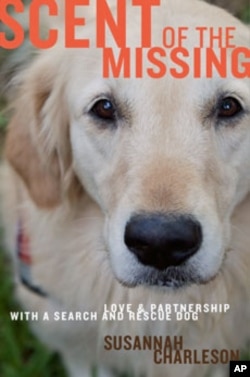In almost any American disaster — from a terrorist attack to an earthquake — you'll see search-and-rescue dogs sniffing the ground and sampling the air in search of the subtle olfactory cues that will lead them to missing persons, living or dead.
In her new book, "Scent of the Missing: Love and Partnership with a Search-and-Rescue Dog," handler Susannah Charleson chronicles her relationship with a furry, four-legged partner named Puzzle.
Unique partnership
It is noon on a bright springtime day in Manhattan's Riverside Park.
The gently undulating green space abuts the busy West Side Highway, not far from the Hudson River. Joggers, picnickers and schoolchildren are all here.
"This would not necessarily be a terribly easy or quick place to search," says Susannah Charleson after a quick assay of the area. Charleson is visiting New York with her partner, Puzzle, a blonde female Golden Retriever. The team is part of Mark-9 Search and Rescue in Dallas, Texas.
There are no reported missing persons in Riverside Park today, but Charleson considers how they would begin a search here.
The weather and terrain pose some interesting challenges. "You've got lots of little hills and valleys that would be channeling scent the way water channels down a physical ravine," she says. "And we know that when scent hits horizontal surfaces like the sides of buildings, it responds to that. It will go up. It will go out."
Charleson points to the cars zooming by on the highway, perhaps 200 meters to the west.
"You are getting a lot of churn from all that car passage. The human scent is still there but it would be in motion and then the wind would pick it up. So we'd have to see which way the scent is moving by which way the dog is moving."
Strong sense
The landscape of smells that dogs perceive is too rich for humans to even imagine. Charleson likens a dog's ability to find a human scent that may be weeks or months old to our ability to spot a pink dot in a handful of thrown confetti.
Puzzle has been in training for almost all of her life. She's deeply familiar with the myriad smells that humans emit, depending on factors such as age, emotion and whether or not they are alive. Puzzle is a veteran of many search-and-rescue missions following tornadoes and flash floods. She has helped find missing children, as well as elderly Alzheimer's patients who've wandered off.
Search-and-rescue dogs can either find every single human in a given area, as might be needed following a natural or a terrorist disaster. They can smell a scent article such as a shoe or a sock belonging to an individual, and ignore all other human scents during their search of a given area. Puzzle is highly trained in these and other tasks.
The right match
"Puzzle came from a litter of 10 puppies all of which were aptitude-tested at six weeks and 10 weeks old for various gifts; high drive, willingness to work for a human, curiosity, problem solving skills, intuitiveness, tenacity."
After careful consideration, the breeder and the head trainer on Charleson's canine search-and-rescue team picked Puzzle to be her partner. "It was almost like an arranged marriage," she says.
Like most Golden Retrievers, Puzzle has a friendly personality and a tail that never seems to stop wagging. But Charleson explains that much more than that is needed for a working dog with a life or death job.
"Certainly obedience is at the heart of good search work because obedience means both handler and dog are disciplined. And you've got to have discipline" Still, she stresses that this is no dictatorship.
"It's a respectful partnership. We joke that the dogs catch on quicker than the handlers do. And it's true. So we respect their gifts and let them do their job."
Thrill of the chase
Search-and-rescue dogs do seem to take joy in a job well done. Charleson remembers the time an autistic child had been missing for eight hours. A team of dogs was given a whiff of his sock and went out on the trail.
"When the boy was found, every single dog was downwind of him at the time and they all were elated. It was very much a moment of 'You are why we're here.' Because he was found. He was home. He was the objective. He was their rock star."
Whatever the outcome, Charleson says that search-and-rescue dogs always work hard and heroically, often in conditions of great danger. "They jump into these situations because we ask them to do so, and they do so with good heart because they know we need them to do it."
With no human searches to conduct at the moment Puzzle now searching for a bit of playtime — a game of fetch and a serious romp. Hardworking and heroic, she may be but Puzzle is still a dog.






